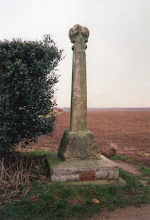Picts (II/68 a) vs. Middle Imperial Romans (II/64 a)
It was late Saturday night, I couldn't get into painting, so instead I tried my first DBA game using the latest Solo DBA variant. I have played many solo games over the years, but not with the benefit of this rules variant.
The Romans rolled the lowest aggression score (becoming the non-player general (NPG)) so I styled this encounter as a Pictish raid on the Roman frontier.
For the purposes of this description I assume the Picts are deploying to the north of the battlefield and the Romans to the south. The random terrain placement rules saw a north-south road running along the eastern edge of the battlefield pass through a fortified Pictish village and woods. A steep hill was the centre of the Roman deployment zone.
NPG deployment resulted in a placement that looked like the Romans were leaving their marching camp in columns with cavalry (2 x 3Cv inc. gen.) and light horse (1 x 2LH) to the west (with the general), auxiliaries (3 x 4Ax) marching over a steep hill in the centre, legionaries (4 x 4Bd) and bows (1 x 4Bw) in a reserve column behind the centre and ballistas (1 x Art) advancing along the roadway to the east. (NB: One blade element should have been a 3Bd and the Bw I used only has two figures on base).

Initial deployment from point of view of NPG
The Roman general took a largely defensive stance forming a line of battle with his mounted troops on his left flank and moving the legionaries and bows that were in reserve up towards his centre. His auxiliaries moved quickly to occupy the woods on his right flank with support from the ballistas. Meanwhile the Picts advanced their line largely as deployed with the garrison of the BUA advancing towards the wood to restrict enemy road movement on the left flank.
With the legionaries still struggling through bad going, it fell to the auxiliaries on the Roman right to slow the Pictish advance. A Pictish warband slammed into the centre of the auxiliaries and a deep formation of spears supported by skirmishers (psiloi) attacked their right flank. Pictish spear moved up into the forest on the left to provide some support for the exposed flank of the warband. The warband was repulsed, but the spears took first blood by destroying the auxiliaries caught outside of the woods.
In the woods the Pictish spear advanced to contact with the auxiliaries that were overlapping the left flank of the warband. With its flank secure, the warband again charged forward to contact the remaining unit of auxiliary. The Pictish spears were destroyed being no match for the auxiliaries in the woods, while the warband pushed their opponents back and impetuously followed up their attack. The main Pictish line advanced with the skirmishers on the left flank contacting the Roman bows at the head of the column of legionaries – recoiling the column.
While the legionaries finally formed a line of battle in the centre, the previously repulsed bows let loose a storm of arrows that destroyed the skirmishers to their front. The auxiliaries on the Roman right flank responded by contacting the warband on its front and left flank. However the warband repulsed this assault and fiercely pursued the auxiliaries out of the woods. (Pictured below - Romans 1: Picts 2)
The Pictish centre and right advanced into close combat with the newly formed Roman line with light horse sweeping around to contact the end of the Roman left flank. On the Pictish left the warband supported by spears slammed once more into the unit of auxiliaries now in open ground, while efforts were made to secure the extreme left flank. However the beginning of the end was seen when Roman ballistas rained bolts down on the left flank of the warband causing it to recoil from contact. The Pictish chieftain and his light horse destroyed the Roman light horse on the end of the Roman's left flank but his centre collapsed with a unit each of spear and skirmishers destroyed and the remaining units repulsed.
Overall, I found the terrain placement, NPG deployment and tactical engines for the NPG very satisfactory. The Romans successfully played a largely defensive game with the exception of the auxiliaries rushing to grab the bad going on the Roman right – a manoeuvre acceptable for a defensive command according to the Solo DBA system. The Picts came to grief under my command largely through the poor match-ups (particularly psiloi against mounted and the spear against auxiliaries in bad going) and the rather impetuous charge to contact in the centre and right.
A very enjoyable game and one that certainly gives me great enthusiasm to explore this solo DBA system further.

















